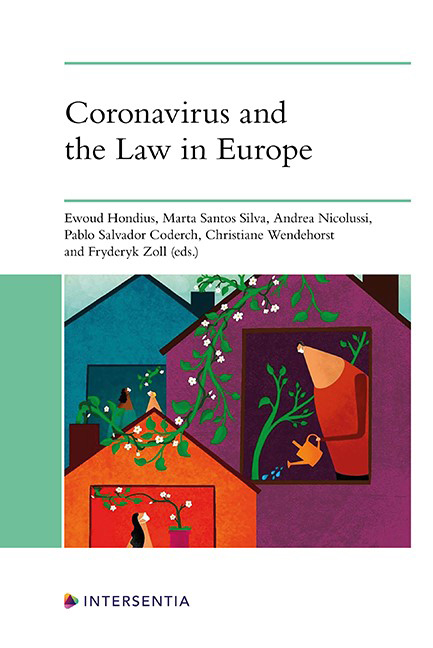Book contents
- Frontmatter
- Preface
- Contents
- List of Keywords
- List of Contributors
- PART I COVID-19 AND FUNDAMENTAL RIGHTS
- PART II STATES AGAINST THE PANDEMIC
- PART III COMPENSATION FOR COVID-19 RELATED DAMAGE
- PART IV CONTRACT LAW
- PART V CONSUMER LAW
- PART VI LABOUR AND SOCIAL LAW
- PART VII CORONAVIRUS CHANGING EUROPE
- Epilogue
- Annex: ELI Principles for the COVID-19 Crisis
- About the Editors
The Italian Constitutional Court and the Pandemic: A National and Comparative Perspective
Published online by Cambridge University Press: 10 December 2021
- Frontmatter
- Preface
- Contents
- List of Keywords
- List of Contributors
- PART I COVID-19 AND FUNDAMENTAL RIGHTS
- PART II STATES AGAINST THE PANDEMIC
- PART III COMPENSATION FOR COVID-19 RELATED DAMAGE
- PART IV CONTRACT LAW
- PART V CONSUMER LAW
- PART VI LABOUR AND SOCIAL LAW
- PART VII CORONAVIRUS CHANGING EUROPE
- Epilogue
- Annex: ELI Principles for the COVID-19 Crisis
- About the Editors
Summary
Never before have the world’s democracies simultaneously experienced such a major contraction of civil liberties as during the “new” coronavirus pandemic, producing massive debates about the role of government power during times of crisis. This contribution focuses on the response provided by constitutional courts to face the emergency. The attitude of the Italian court can be effectively summarised by the following keywords: continuity, loyal cooperation, autonomy, step-by-step approach, working methods. From a comparative perspective, the reaction of many other national and supranational courts was not so different and inspired by the same criteria.
INTRODUCTION
Italy, well-known to be the first European country overwhelmed by the pandemic, found itself in the uncomfortable position of having to experiment with the tools and strategies – health-related, economic and legal – to tackle it.
In this situation, the very functioning of the constitutional bodies was severely tested. However, faced with the clear inevitable prevalence of government action in managing the emergency, it was necessary to ensure above all that the supervisory bodies, both political (the President of the Republic) and jurisdictional (the Constitutional Court, with a typically counter-majoritarian vocation, and the whole judiciary), would not fail in their essential functions.
As an initial assessment of these difficult months – March/June 2020 –, it can be said that the Italian supervisory system, on the whole, acquitted itself very well.
In particular, the ways the Italian Constitutional Court (ItCC) handled the situation were effective and perfectly aligned with those adopted by other European constitutional courts and the two European courts of Luxembourg and Strasbourg. Although the President of the ItCC, Marta Cartabia, contracted the coronavirus, this did not affect her role, given that, even with the illness, she continued to fulfil all her responsibilities overseeing the body, including that of presiding over the college (remotely, of course) during strictly judicial activity.
This contribution will illustrate the functioning of Italian constitutional justice, first in normal times, then during the coronavirus emergency (sections 2–3), thereby placing the Italian situation in the comparative context (sections 4–6).
THE ItCC IN ORDINARY TIMES
It should first be said that with absolute fidelity to the Kelsenian court model, the ItCC is not part of the judiciary in the strict sense, though its functions are certainly jurisdictional.
- Type
- Chapter
- Information
- Coronavirus and the Law in Europe , pp. 55 - 80Publisher: IntersentiaPrint publication year: 2021



